Text

バートランド・ラッセルの言葉366_画像版 n.3169j (July 05, 2025)
アメリカ国民の大多数は、アメリカのやり方は唯一自然なやり方であり、また,アメリカの統治形態は自然な統治形態であると考え、そして、アメリカに存在する弊害も、人間の本性上、(どこの国にも)避けがたく生じるような種類のものにすぎない、と感じている。同じようなことは、中国大陸の中心部や、他の広大で均質な大陸の中心部ではどこでも見られるだろう。従って、「島国根性」は、島の住人の特徴ではなく、逆に、広大な内陸諸国の住民の間で最も普通に見られる特徴であると思われる。
The bulk of the population feels that American ways are the only natural ways, American forms of government the natural forms of government, and American abuses only such as human nature makes inevitable. The same sort of thing would be found in the centre of China or of any large homogeneous continental area. It would seem, therefore, that 'insularity', so far from being a characteristic of islanders, is, on the contrary, most often to be found among the inhabitants of vast inland countries.. Source: On insularity, by Bertrand Russell More info.: https://russell-j.com/INSULAR.HTM
<寸言> アメリカは、広大な国土と豊富な資源を有し、本気で望めば、他国との関係を最小限にした、自国中心の経済を成立させることも可能なほど自立的な国家です。国民は多様な人種からなっていますが、長年にわたり「アメリカ的生活様式」という��通の文化的枠組みが形成されてきました。 こうした文化的・価値観的な均質性は、国民の一体感やナショナリズムを育む一方で、ヨーロッパのような文化的多様性を欠き、他国の事情への理解を阻む傾向もあります。近年のアメリカの外交姿勢や移民政策に見られるように、自国に直接関係しないことがらへの想像力の欠如が政治的にも現れています。 現在二期目の大統領職にあるドナルド・トランプは、そういった傾向を象徴するような存在だと言えないでしょうか? 彼の尊大な態度は、アメリカの圧倒的な国力(経済力及び軍事力)に裏打ちされたものであり、また、国内への「内向き志向」を反映したものでもあります。しかし皮肉なことに、彼の掲げるMAGA(Make America Great Again)政策は、国際的信頼の低下や同盟の動揺など、長期的にはアメリカ自身の国力を損なう可能性をはらんでいます。
The United States is a highly self-sufficient nation, with vast land and abundant resources. If it so desires, it could even sustain a largely self-contained economy with minimal dependence on other countries. While its population is made up of diverse ethnic groups, a shared cultural framework known as the "American way of life" has been formed over many years. This cultural and ideological uniformity has both strengths and weaknesses. On the one hand, it fosters a strong sense of national unity and patriotism; on the other, it lacks the kind of cultural diversity seen in Europe and tends to hinder efforts to understand the values and circumstances of other nations. As seen in recent U.S. foreign policy and immigration measures, a lack of imagination regarding issues not directly related to the United States has become evident in the political sphere as well. Isn't Donald Trump, now serving his second term as President, a symbolic figure of this trend? His overbearing attitude is supported by America's overwhelming economic and military power, and also reflects a prevailing inward-looking mindset among the American public. Ironically, however, the MAGA (Make America Great Again) agenda he promotes may, in the long run, end up undermining the very strength of the United States--through a decline in international trust and the weakening of key alliances.
0 notes
Text
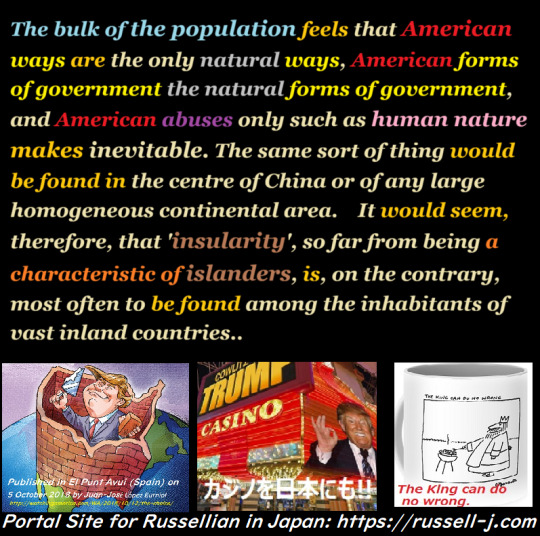
Bertrand Russell Quotes 366 with images, n3169 (July 05, 2025)
The bulk of the population feels that American ways are the only natural ways, American forms of government the natural forms of government, and American abuses only such as human nature makes inevitable. The same sort of thing would be found in the centre of China or of any large homogeneous continental area. It would seem, therefore, that 'insularity', so far from being a characteristic of islanders, is, on the contrary, most often to be found among the inhabitants of vast inland countries.. Source: On insularity, by Bertrand Russell More info.: https://russell-j.com/INSULAR.HTM
a brief comment: The United States is a highly self-sufficient nation, with vast land and abundant resources. If it so desires, it could even sustain a largely self-contained economy with minimal dependence on other countries. While its population is made up of diverse ethnic groups, a shared cultural framework known as the "American way of life" has been formed over many years. This cultural and ideological uniformity has both strengths and weaknesses. On the one hand, it fosters a strong sense of national unity and patriotism; on the other, it lacks the kind of cultural diversity seen in Europe and tends to hinder efforts to understand the values and circumstances of other nations. As seen in recent U.S. foreign policy and immigration measures, a lack of imagination regarding issues not directly related to the United States has become evident in the political sphere as well. Isn't Donald Trump, now serving his second term as President, a symbolic figure of this trend? His overbearing attitude is supported by America's overwhelming economic and military power, and also reflects a prevailing inward-looking mindset among the American public. Ironically, however, the MAGA (Make America Great Again) agenda he promotes may, in the long run, end up undermining the very strength of the United States--through a decline in international trust and the weakening of key alliances.
0 notes
Text
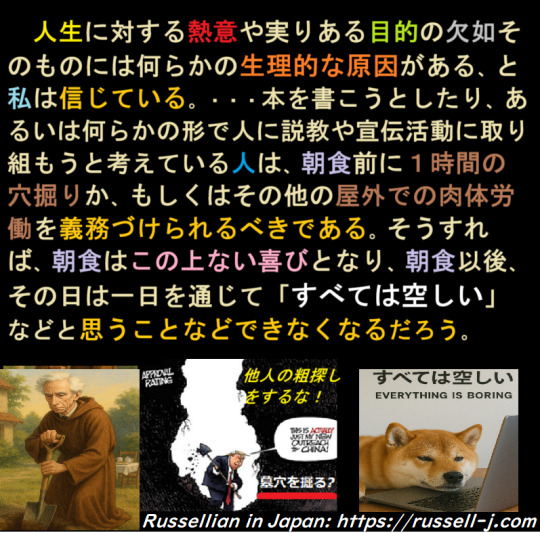
バートランド・ラッセルの言葉366_画像版 n.3168j (July 04, 2025)
人生に対する熱意や実りある目的の欠如そのものには、何らかの生理的な原因がある、と私は信じている。・・・本を書こうとしたり、あるいは何らかの形で人に説教や宣伝活動に取り組もうと考えている人は、朝食前に1時間の穴掘りか、もしくはその他の屋外での肉体労働を義務づけられるべきである。そうすれば、朝食はこの上ない喜びとなり、朝食以後、その日は一日を通じて「すべては空しい」などと思うことなどできなくなるだろう。
I believe the lack of zest and of fruitful purpose itself has physiological causes…. Any man who contemplates writing a book or engaging in any forms of preaching or propaganda should be obliged to do an hour's digging or other outdoor manual work before breakfast. By that time breakfast would be such a delight that throughout the rest of the day he would be incapable of thinking that all is vanity. Source: "Why are we discontented?" [From: Mortals and Others: Bertrand Russell's American Essays, 1931-1935, v.1 (1975)] More info.: https://russell-j.com/YOKKYU.HTM
<寸言> 私は以前この文章(添付画像の「本日のラッセルの言葉」)を引用した時、3つの画像を添付しました。つまり、「トランプ大統領が穴掘りをしているイラスト」、「ショーペンハウエルが苦虫をかみつぶしているような写真」及び「猫が退屈そうにパソコンのキーボードに顎をおいて居眠りしている写真」です。 今回は、3枚のうち2枚を変えたいと思い、ChatGPTに「「修道僧のような格好をした哲学者(バートランド・ラッセル)がスコップを持って真面目に穴掘りしている風刺画」を作画してみてください、写真の合成でもけっこうです。」と指示したら、添付画像の左側の写真を提供してくれました。また、「猫を犬に変えてください」とお願いしたら添付画像の右側の写真を提供してくれました。両方ともよくできてきていると思いますが、いかがでしょうか?
When I previously quoted this passage (i.e., "Today's Words from Russell"), I attached three images: an illustration of President Trump digging a hole, a photo of Schopenhauer looking as if he had just swallowed a bitter bug, and a picture of a cat dozing off with its chin resting on a computer keyboard, looking thoroughly bored. This time, I wanted to replace two of the three images, so I asked ChatGPT to create "a satirical drawing of a philosopher (Bertrand Russell) dressed like a monk, seriously digging with a spade." It responded with the image on the left. Then, I asked it to "replace the cat with a dog," and it provided the image on the right. I think both are quite well done--what do you think?
0 notes
Text
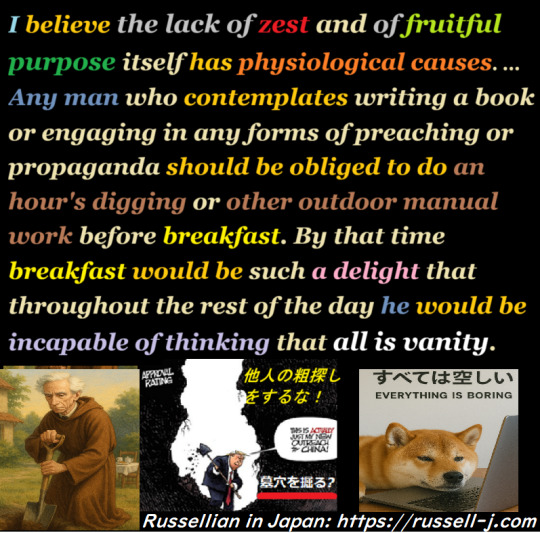
Bertrand Russell Quotes 366 with images, n3168 (July 04, 2025)
I believe the lack of zest and of fruitful purpose itself has physiological causes…. Any man who contemplates writing a book or engaging in any forms of preaching or propaganda should be obliged to do an hour's digging or other outdoor manual work before breakfast. By that time breakfast would be such a delight that throughout the rest of the day he would be incapable of thinking that all is vanity. Source: "Why are we discontented?" [From: Mortals and Others: Bertrand Russell's American Essays, 1931-1935, v.1 (1975)] More info.: https://russell-j.com/YOKKYU.HTM
a brief comment: When I previously quoted this passage (i.e., "Today's Words from Russell"), I attached three images: an illustration of President Trump digging a hole, a photo of Schopenhauer looking as if he had just swallowed a bitter bug, and a picture of a cat dozing off with its chin resting on a computer keyboard, looking thoroughly bored. This time, I wanted to replace two of the three images, so I asked ChatGPT to create "a satirical drawing of a philosopher (Bertrand Russell) dressed like a monk, seriously digging with a spade." It responded with the image on the left. Then, I asked it to "replace the cat with a dog," and it provided the image on the right. I think both are quite well done--what do you think?
0 notes
Text
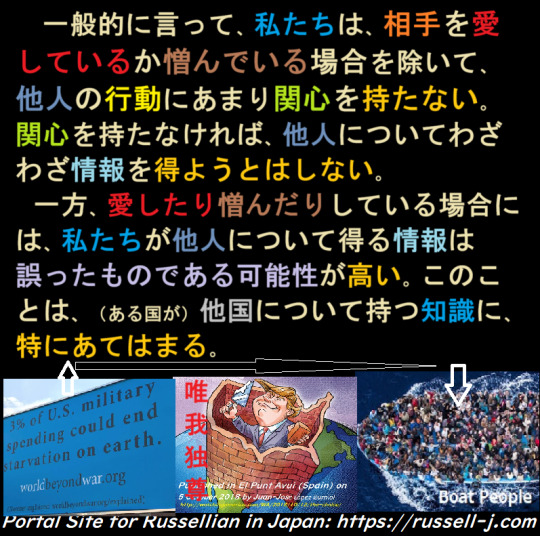
バートランド・ラッセルの言葉366_画像版 n.3167j (July 03, 2025)
一般的に言って、私たちは、相手を愛しているか憎んでいる場合を除いて 他人の行動にあまり関心を持たない。関心を持たなければ、他人についてわざわざ情報を得ようとはしない。一方、愛したり憎んだりしている場合には、私たちが他人について得る情報は誤ったものである可能性が高い。このことは、(ある国が)他国について持つ知識に、特にあてはまる。
We do not, as a rule take a very great interest in the doings of other people unless we either love or hate them. If we do not take an interest in them, we do not take the trouble to get information about them; while if we either love or hate them, the information which we shall obtain is likely to be misinformation. This applies in particular to one nation's knowledge of another nation. Source: "As others see us" [From: Mortals and Others: Bertrand Russell's American Essays, 1931-1935, v.1 (1975)] More info.: https://russell-j.com/AS-O-SEE.HTM
0 notes
Text
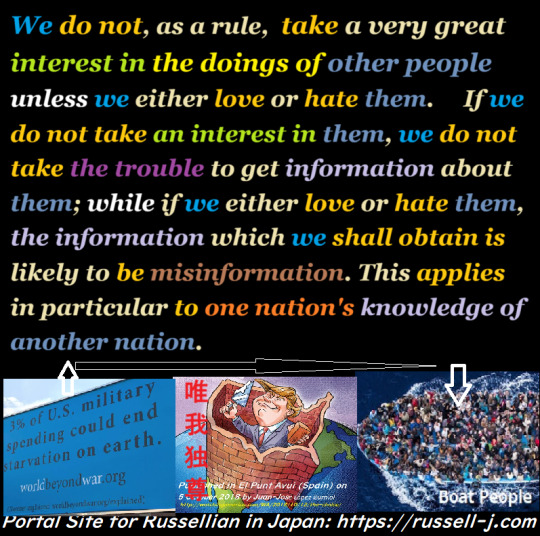
Bertrand Russell Quotes 366、July 3.2025
We do not, as a rule take a very great interest in the doings of other people unless we either love or hate them. If we do not take an interest in them, we do not take the trouble to get information about them; while if we either love or hate them, the information which we shall obtain is likely to be misinformation. This applies in particular to one nation's knowledge of another nation. Source: "As others see us" [From: Mortals and Others: Bertrand Russell's American Essays, 1931-1935, v.1 (1975)] More info.: https://russell-j.com/AS-O-SEE.HTM
0 notes
Text
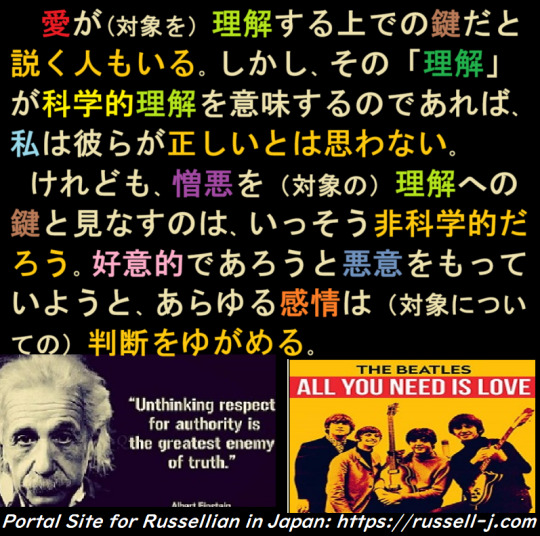
バートランド・ラッセルの言葉366_画像版 n.3166j (July 02, 2025)
愛が(対象を)理解する上での鍵だと説く人もいる。しかし、その「理解」が科学的理解を意味するのであれば、私は彼らが正しいとは思わない。けれども、���悪を(対象の)理解への鍵と見なすのは、いっそう非科学的だろう。好意的であろうと悪意をもっていようと、あらゆる感情は(対象についての)判断をゆがめる。
There are those who say that love is the key to understanding, but if scientific understanding is meant, I do not think they are right. It would, however, be even more unscientific to regard hatred as the key to understanding. Every emotion, whether friendly or unfriendly, distorts judgement. Source: "As others see us" [From: Mortals and Others: Bertrand Russell's American Essays, 1931-1935, v.1 (1975)] More info.: https://russell-j.com/AS-O-SEE.HTM
<寸言> 佐藤ヒロシ(著)『関係詞の底力』(プレイス出版、2011年刊)は、英文読解における多くの誤解(誤読)に気づかせてくれる名著であり、躊躇なくお薦めできます。著者は、本書出版当時、代々木ゼミ予備校を代表する英語講師の一人で、ラッセル関係の出版企画の関係で一度だけお会いしたことがあります(ただし企画はとりやめとなりました)。 本書にでてくる次の2つの英文を試しに日本語に訳してみてください。 (1) All you need is love (ビートルズのレコードの歌詞の一部/「本日のラッセルの言葉」への添付画像の中にでてきています!) (2) All the people in Iraq want is peace and security. (1) は「愛こそすべて」と訳されることが多いようですが、これは不適切な訳しかたです(注:“All you need is ~" は「All (that) you need is ~」の "that"が省略されたものです)。同様に、(2)を「すべてのイラクの人々が欲しているのは、平和と安定だ」と訳すのも不適切です。 より適切な訳は「君(あるいは、あなたたち)に足りないのは愛だけだ!」及び、「イラクの人々が望んでいるのは、平和と安定だけだ!」となります。それは、省略されている関係詞に注意すれば気が付くと思われます。興味のある方は、是非、アマゾンなどで『関係詞の底力』を入手してお読みになってください。 「本日のラッセルの言葉」をトランプ大統領に捧げたいところですが、理解しようとしないでしょうから、「豚に真珠」になりそうです。
"The True Power of Relative Clauses" (published by Place in 2011), written by Hiroshi Sato, is a remarkable book that sheds light on many common misunderstandings in English reading comprehension. I can recommend it without hesitation. At the time of its publication, the author was one of the leading English instructors at Yoyogi Seminar, a major prep school in Japan. I had the chance to meet him once in connection with a publishing project on Bertrand Russell (though the project was ultimately cancelled). Please try translating the following two English sentences that appear in the book:
All you need is love. (This is a lyric from a Beatles record--it also appears in the image attached to "Today's Words from Russell"!) All the people in Iraq want is peace and security.
Sentence (1) is often rendered in Japanese as 「愛こそすべて」 ("Love is all you need"), but this is an inaccurate translation. (Note: "All you need is ~" is a reduced form of "All that you need is ~1", with the relative pronoun "that" omitted.) Likewise, translating sentence (2) as 「すべてのイラクの人々が欲しているのは平和と安定だ」 is also inappropriate.
More accurate translations would be: "The only thing you (or you all) lack is love!" "What the people of Iraq want is nothing but peace and security!" If you pay close attention to the omitted relative pronoun, you will notice the true structure. For those interested, I highly encourage you to get a copy of The True Power of Relative Clauses, available on sites such as Amazon.
0 notes
Text
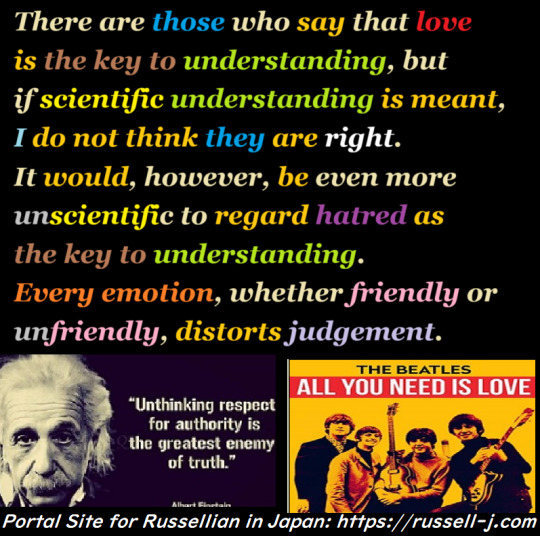
Bertrand Russell Quotes 366 with images, n3166 (July 02, 2025)
There are those who say that love is the key to understanding, but if scientific understanding is meant, I do not think they are right. It would, however, be even more unscientific to regard hatred as the key to understanding. Every emotion, whether friendly or unfriendly, distorts judgement. Source: "As others see us" [From: Mortals and Others: Bertrand Russell's American Essays, 1931-1935, v.1 (1975)] More info.: https://russell-j.com/AS-O-SEE.HTM
a brief comment: "The True Power of Relative Clauses" (published by Place in 2011), written by Hiroshi Sato, is a remarkable book that sheds light on many common misunderstandings in English reading comprehension. I can recommend it without hesitation. At the time of its publication, the author was one of the leading English instructors at Yoyogi Seminar, a major prep school in Japan. I had the chance to meet him once in connection with a publishing project on Bertrand Russell (though the project was ultimately cancelled). Please try translating the following two English sentences that appear in the book:
All you need is love. (This is a lyric from a Beatles record--it also appears in the image attached to "Today's Words from Russell"!) All the people in Iraq want is peace and security.
Sentence (1) is often rendered in Japanese as 「愛こそすべて」 ("Love is all you need"), but this is an inaccurate translation. (Note: "All you need is ~" is a reduced form of "All that you need is ~1", with the relative pronoun "that" omitted.) Likewise, translating sentence (2) as 「すべてのイラクの人々が欲しているのは平和と安定だ」 is also inappropriate.
More accurate translations would be: "The only thing you (or you all) lack is love!" "What the people of Iraq want is nothing but peace and security!" If you pay close attention to the omitted relative pronoun, you will notice the true structure. For those interested, I highly encourage you to get a copy of The True Power of Relative Clauses, available on sites such as Amazon.
0 notes
Text
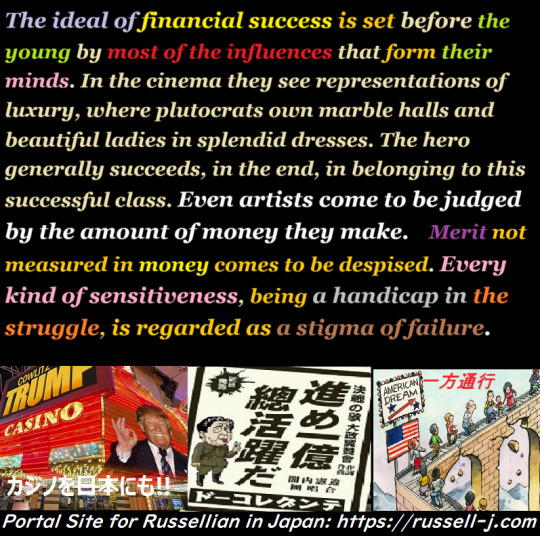
Bertrand Russell Quotes 366 with images, n3165 (July 01, 2025)
The ideal of financial success is set before the young by most of the influences that form their minds. In the cinema they see representations of luxury, where plutocrats own marble halls and beautiful ladies in splendid dresses. The hero generally succeeds, in the end, in belonging to this successful class. Even artists come to be judged by the amount of money they make. Merit not measured in money comes to be despised. Every kind of sensitiveness, being a handicap in the struggle, is regarded as a stigma of failure. Source: "The lessons of experience" (In: Mortals and Others: Bertrand Russell's American Essays, 1931-1935, v.1 (1975)) More info.: https://russell-j.com/HOPEFEAR.HTM
a brief comment: Driven by the fear that taking detours might lead to "falling behind," young people try to stay on the rails laid down by society without "derailing." They are expected to acquire the knowledge, skills, and even moral values deemed necessary by society, and are put through various tests to assess how well they have done so. They are sifted and sorted, eventually find employment, become part of an organization, and are "managed" as members of society. Under the national slogan of "All Citizens Must Play an Active Role," they are expected to contribute as productive workers. Even in old age, they are told to prepare carefully so as not to burden society, and if they fail to do so and fall into hardship after retirement, they are coldly regarded as having no one to blame but themselves.
0 notes
Text

バートランド・ラッセルの言葉366_画像版 n.3165j (July 01, 2025)
金銭面での成功という理想が、若者の心を形づくる多くの影響力によって彼らの前に掲げられる。若者たちは、映画では贅沢を表現したものを見る。そこには、大理石の広間を所有する大富豪や華麗なドレスに身を包んだ美女たちが登場し、映画の主人公もたいてい、最後にはそうした成功者の仲間入りを果たす。芸術家でさえ、どれだけ稼いだかで評価されるようになり、金銭で測れない価値は見下される。あらゆる感受性は、競争の場ではハンディキャップと見なされるため、敗者の烙印を押されてしまう。
The ideal of financial success is set before the young by most of the influences that form their minds. In the cinema they see representations of luxury, where plutocrats own marble halls and beautiful ladies in splendid dresses. The hero generally succeeds, in the end, in belonging to this successful class. Even artists come to be judged by the amount of money they make. Merit not measured in money comes to be despised. Every kind of sensitiveness, being a handicap in the struggle, is regarded as a stigma of failure. Source: "The lessons of experience" (In: Mortals and Others: Bertrand Russell's American Essays, 1931-1935, v.1 (1975)) More info.: https://russell-j.com/HOPEFEAR.HTM
<寸言> いろいろと寄り道をしていると「脱落」してしまうのではないかという不安に駆られ、若者たちは世間が敷いたレールから「脱線」しないように歩こうとする。社会に期待される知識や技能、さらには道徳観を身につけ、それがどれほど身についているかを「さまざまなテスト」で試され、ふるいにかけられ、やがて就職し、組織に属��、社会人として「管理」されていく。そして「一億総活躍」のスローガンのもと、働く社会の一員となる。老後についても、社会に迷惑をかけないよう準備を怠るなと求められ、それに従わず定年退職後に困窮すれば、「それは自業自得だ」と冷たく見なされる。 これはトランプの掲げる「理想」とその行き先(結果)とでも言ったらよいでしょうか?
Driven by the fear that taking detours might lead to "falling behind," young people try to stay on the rails laid down by society without "derailing." They are expected to acquire the knowledge, skills, and even moral values deemed necessary by society, and are put through various tests to assess how well they have done so. They are sifted and sorted, eventually find employment, become part of an organization, and are "managed" as members of society. Under the national slogan of "All Citizens Must Play an Active Role," they are expected to contribute as productive workers. Even in old age, they are told to prepare carefully so as not to burden society, and if they fail to do so and fall into hardship after retirement, they are coldly regarded as having no one to blame but themselves.
0 notes
Text
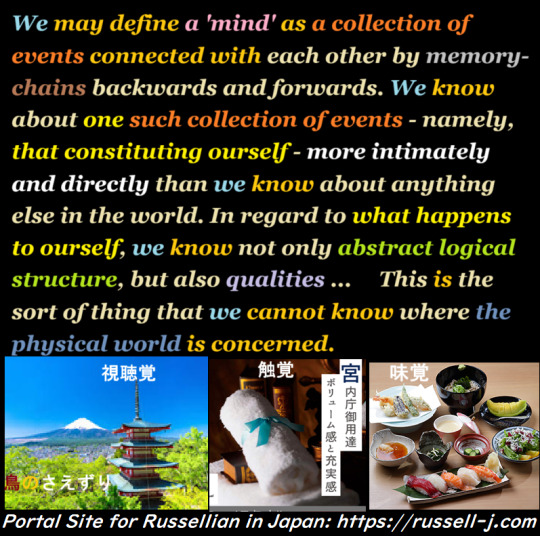
Bertrand Russell Quotes 366 with images, n3164 (June 30, 2025)
We may define a 'mind' as a collection of events connected with each other by memory-chains backwards and forwards. We know about one such collection of events - namely, that constituting ourself - more intimately and directly than we know about anything else in the world. In regard to what happens to ourself, we know not only abstract logical structure, but also qualities … This is the sort of thing that we cannot know where the physical world is concerned. Source: Bertrand Russell: My Philosophical Development, 1959, chapter 2 More info.: https://russell-j.com/beginner/BR_MPD_02-120.HTM
0 notes
Text
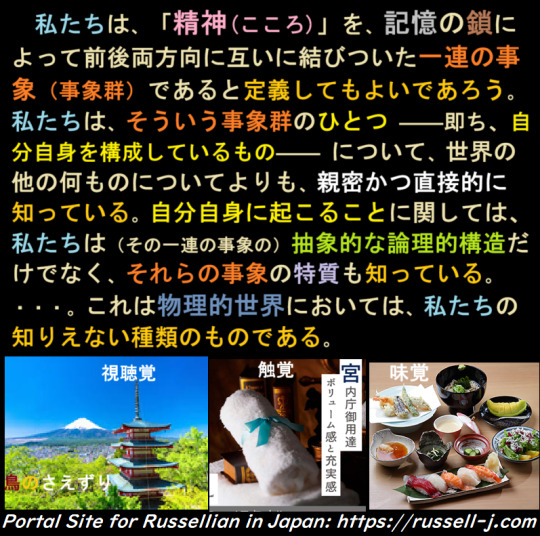
バートランド・ラッセルの言葉366_画像版 n.3164j (June 30, 2025)
私たちは、「精神(こころ)」を、記憶の鎖によって前後両方向に互いに結びついた一連の事象(事象群)であると定義してもよいであろう。私たちは、そういう事象群のひとつ ――即ち、自分自身を構成しているもの―― について、世界の他の何ものについてよりも、親密かつ直接的に知っている。自分自身に起こることに関しては、私たちは(その出来事の)抽象的な論理的構造だけでなく、それらの事象の特質も知っている。・・・これは物理的世界においては、私たちの知りえない種類のものである。
We may define a 'mind' as a collection of events connected with each other by memory-chains backwards and forwards. We know about one such collection of events - namely, that constituting ourself - more intimately and directly than we know about anything else in the world. In regard to what happens to ourself, we know not only abstract logical structure, but also qualities … This is the sort of thing that we cannot know where the physical world is concerned. Source: Bertrand Russell: My Philosophical Development, 1959, chapter 2 More info.: https://russell-j.com/beginner/BR_MPD_02-120.HTM
<寸言> 私たちは、自分の感覚器官を通じて少しずつ世界を理解していきます。ところが日常生活では、直接経験していないのに「知っているつもり」になっていることが少なくありません。これは推論と想像力という人間の強みの裏返しであり、ときに誤解や錯覚をも生み出します。 たとえば「本日のラッセルの言葉」に添えられた三つの写真をご覧ください。 ・左: 森の木立の間から富士山を望む風景(視覚・聴覚を喚起) ・中央: 最高級タオルのクローズアップ(触覚を喚起) ・右: 日本料理のフルコース(味覚・嗅覚を喚起)
私たちは過去の知識と体験を手がかりに、これらの画像が示す「質感」を瞬時に想像します。哲学の語彙でいえばクオリアです。日本で育った多くの人は似た印象を共有しますが、異文化で暮らす人々は必ずしも同じ感覚を抱くとは限りません。まして十分な経験をもたない乳児には、こうした質感を理解すること自体が難しいでしょう。 ここでラ��セルの中立一元論に目を向けると、物理的世界と心的世界は二つの別個の実体ではなく、どちらも単一の「中立的素材(neutral stuff)」の現れと考えられます。この立場に立てば、身体の死とともに心も消えるという結論は自然です。神秘主義的な余地はなく、人類が絶滅すれば「人間の心」もまた宇宙から姿を消す――それだけのことでしょう。 もし「心」が人類誕生以前から宇宙に潜在していた、と主張するなら、神のような超越的存在を前提にせざるを得ません。しかし、その神は実在するのでしょうか。それとも人間の想像が生み出した観念にすぎないのでしょうか。――私はラッセルに倣い、理論的には不可知論を認めつつ、実践的には無神論の立場を取りたいと思います。
We gradually come to understand the world through our sense organs. Yet in everyday life we often think we know things we have never directly experienced. This tendency is the flip side of our powers of inference and imagination, and it can sometimes lead to misunderstandings or illusions. Take, for example, the three photographs attached to "Today's Russell Quotation": Left: a view of Mt Fuji glimpsed through forest trees (prompting sight -- and perhaps imagined sounds of the woods) Center: a close-up of a luxury towel (prompting the sense of touch) Right: a full course of Japanese cuisine (prompting taste and smell)
Relying on our past knowledge and experience, we instantly imagine the texture each image suggests--the philosopher's "qualia." Many people raised in Japan share roughly the same impressions, whereas those from different cultural backgrounds may not. Infants, who lack sufficient experience, can scarcely grasp such textures at all. Turning to Russell's neutral monism, the physical and the mental are not two distinct substances; both are manifestations of a single neutral stuff. From this standpoint it is only natural to conclude that when the body dies, the mind disappears as well. There is nothing mystical about it: if humankind were to become extinct, the human mind would likewise vanish from the universe -- no more and no less. Anyone who claims that mind existed in the cosmos before the emergence of humanity must presuppose a transcendent being akin to a god. But does such a god truly exist, or is it merely a product of human imagination? -- Following Russell, I acknowledge agnosticism in theory, while in practice I adopt an atheistic stance.
0 notes
Text
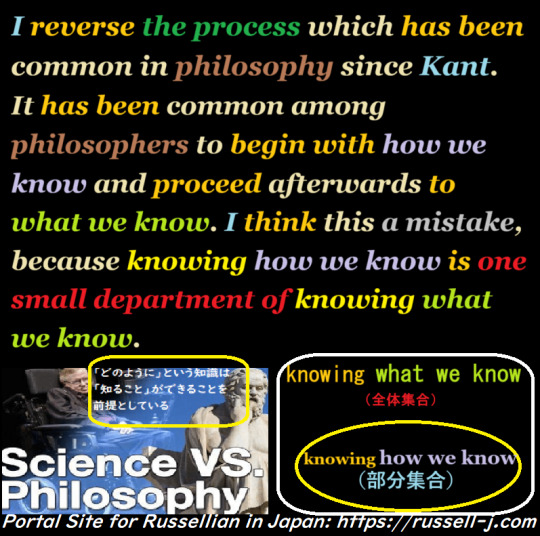
Bertrand Russell Quotes 366 with images, n3163 (June 29, 2025)
I reverse the process which has been common in philosophy since Kant. It has been common among philosophers to begin with how we know and proceed afterwards to what we know. I think this a mistake, because knowing how we know is one small department of knowing what we know. Source: Bertrand Russell: My Philosophical Development, 1959, chapter 2,n.1 More info.: https://russell-j.com/beginner/BR_MPD_02-010.HTM
a brief comment: In the "Russell's Words for Today" (see attached image), Russell claims that "knowing how we know is only a small department--a subset--within the larger set of what we know." To me this seems perfectly obvious. Yet it appears that quite a few people --what one might call the "over-earnest" crowd-- fall into unproductive speculation because they feel they must first tackle how we know before they can know anything at all. Am I mistaken in thinking so? In our time, the various sciences are advancing at a rapid pace, and every day vast amounts of scientific knowledge worth learning are being generated. To avoid getting lost in a speculative maze, I believe that philosophers, especially those concerned with methodology, need a broad base of scientific literacy --quantum information, neuroscience, evolutionary biology, probability theory, AI, and so on. What do you think?
0 notes
Text
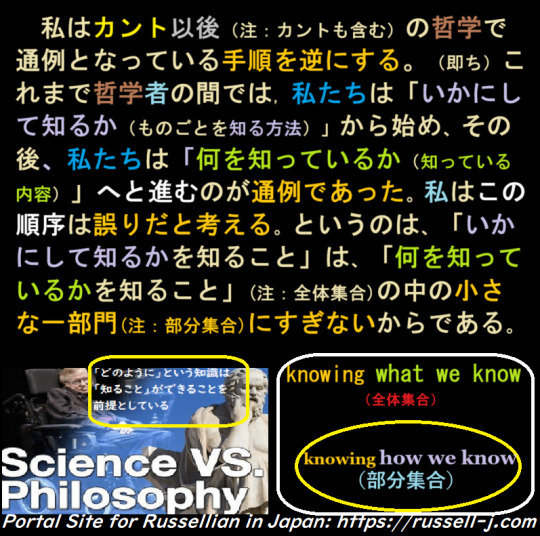
バートランド・ラッセルの言葉366_画像版 n.3163j (June 29, 2025)
私はカント以後(カント自身も含む)の哲学で通例となっている手順を逆にする。これまで哲学者の間では,私たちはいかにして知るか(ものごとを知る方法)から始め、その後「私たちは何を知っているか(知っている内容)」へと進むのが通例であった。私はこの順序は誤りだと考える。というのは、「いかに知るかを知ること」は、「何を知っているかを知ること」(注:全体集合)の中の小さな一部門(注:部分集合)にすぎないからである。
I reverse the process which has been common in philosophy since Kant. It has been common among philosophers to begin with how we know and proceed afterwards to what we know. I think this a mistake, because knowing how we know is one small department of knowing what we know. Source: Bertrand Russell: My Philosophical Development, 1959, chapter 2,n.1 More info.: https://russell-j.com/beginner/BR_MPD_02-010.HTM
<寸言> 「ラッセルの本日の言葉」(添付画像参照)に出てくる「『いかに知るかを知ること』は、『何を知っているか』(注:全体集合)の中の小さな一部門(注:部分集合)にすぎない」というラッセルの主張は、私には当たり前のことだと思われます。しかし、そう考ずに、何かを知る前に「いかに知るか」をまず考えないといけないとの思いから、生産性のない思弁に陥っている人たち(意識高い系)がけっこういるように思われますが、私の思い違いでしょうか? 現代は諸科学が急速に発達しており、知っておいたほうがよい科学的知識が日々膨大に生まれています。思弁を行っているうちに迷路に迷い込まないようにするためにも、特に方法論に関心を持つ哲学者にとっても、幅広い科学的知識(例:量子情報・脳神経科学・進化生物学・確率論・AIなど)が必要だと思いますが、いかがでしょうか?
In the "Russell's Words for Today" (see attached image), Russell claims that "knowing how we know is only a small department--a subset--within the larger set of what we know." To me this seems perfectly obvious. Yet it appears that quite a few people --what one might call the "over-earnest" crowd-- fall into unproductive speculation because they feel they must first tackle how we know before they can know anything at all. Am I mistaken in thinking so? In our time, the various sciences are advancing at a rapid pace, and every day vast amounts of scientific knowledge worth learning are being generated. To avoid getting lost in a speculative maze, I believe that philosophers, especially those concerned with methodology, need a broad base of scientific literacy --quantum information, neuroscience, evolutionary biology, probability theory, AI, and so on. What do you think?
0 notes
Text
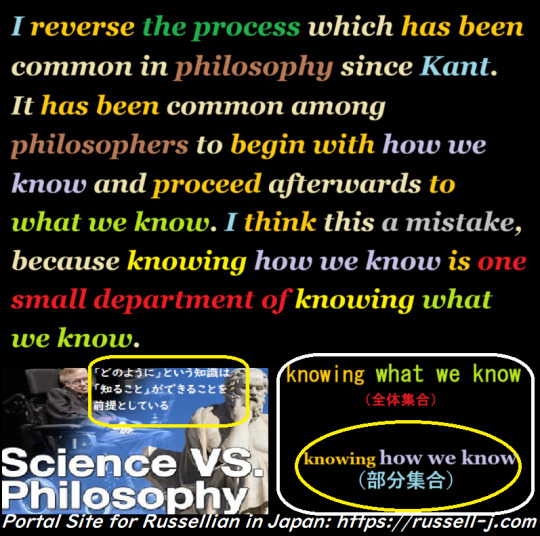
Bertrand Russell Quotes 366 with images, n3163 (June 29, 2025)
I reverse the process which has been common in philosophy since Kant. It has been common among philosophers to begin with how we know and proceed afterwards to what we know. I think this a mistake, because knowing how we know is one small department of knowing what we know. Source: Bertrand Russell: My Philosophical Development, 1959, chapter 2,n.1 More info.: https://russell-j.com/beginner/BR_MPD_02-010.HTM
a brief comment: In the "Russell's Words for Today" (see attached image), Russell claims that "knowing how we know is only a small department--a subset--within the larger set of what we know." To me this seems perfectly obvious. Yet it appears that quite a few people --what one might call the "over-earnest" crowd-- fall into unproductive speculation because they feel they must first tackle how we know before they can know anything at all. Am I mistaken in thinking so? In our time, the various sciences are advancing at a rapid pace, and every day vast amounts of scientific knowledge worth learning are being generated. To avoid getting lost in a speculative maze, I believe that philosophers, especially those concerned with methodology, need a broad base of scientific literacy --quantum information, neuroscience, evolutionary biology, probability theory, AI, and so on. What do you think?
0 notes
Text

バートランド・ラッセルの言葉366_画像版 n.3161j (June 27, 2025)
このようにして、科学技術を用いる実務の専門家、そしてさらにそれらの専門家を雇う政府や大企業は、科学者とはまったく異なる気質を身につけるようになる。それは、無限の力を手に入れた感覚、傲慢な確信、人間さえも(物であるかのように)操ることの快感、に満ちた気質である。これは科学的気質とは正反対のものであるが、それにもかかわらず、科学がこのような気質の助長に一役買っていることは否定できない。
Thus the practical experts who employ scientific technique, and still more the governments and large firms which employ the practical experts, acquire a quite different temper from that of the men of science : a temper full of a sense of limitless power, of arrogant certainty, and of pleasure in manipulation even of human material. This is the very reverse of the scientific temper, but it cannot be denied that science has helped to promote it.
Source: Bertrand Russell: Religion and Science, 1935, chapt. 10: Conclusion More info.: https://russell-j.com/beginner/RS1935_10-010.HTM
<寸言> 権力は、社会秩序の維持や社会の発展に必要な反面、放っておくとあっという間に"タガ"が外れます。ビッグデータとAIも似たような側面があります。暮らしを便利にしてくれる一方、その陰で何が起きているかを見落としやすいので注意が必要です。 たとえば、監視衛星や顔認識を使えば、地球上の誰でもほぼリアルタイムで追跡できます。実際、米国や中国では "undocumented people" や少数民族が「管理すべき対象」とみなされ、拘束や殺害にまで至った例が報告されています。 遠い国の話に思えても、私たちの身近にも同じ構図があります。フェイスブックとケンブリッジ・アナリティカの事件では、数千万の心理データが選挙広告に利用され、世論が水面下で操作されかけました。 便利さに目を奪われるほど、暴走は静かに進みます。だからこそ、「どこまでが恩恵で、どこからが危険か」を自分の頭で嗅ぎ分け、権力と技術を見張る視線だけは緩めないようにしないと、いつの間にか私たちの自由は侵害されてしまいます。
Power is indispensable for maintaining social order and driving progress, yet once its checks loosen, it can run wild in an instant. Big data and AI share the same dual nature: while they make our lives more convenient, they also conceal processes we are apt to overlook. Take surveillance satellites and facial-recognition systems. With them, virtually anyone on Earth can be tracked in real time. In fact, both the United States and China have reportedly treated undocumented people and certain minorities as populations to be "managed," leading in some cases to detention and even killings. This is not just a distant problem. Closer to home, the Facebook-Cambridge Analytica scandal showed how tens of millions of psychological profiles could be fed into targeted political advertising, nudging public opinion below the waterline of awareness. The more dazzled we are by convenience, the more quietly these excesses advance. That is why we must keep asking ourselves where benefit ends and danger begins, and never relax our vigilance over power and technology, otherwise, our freedoms may be eroded before we realize it.
0 notes
Text
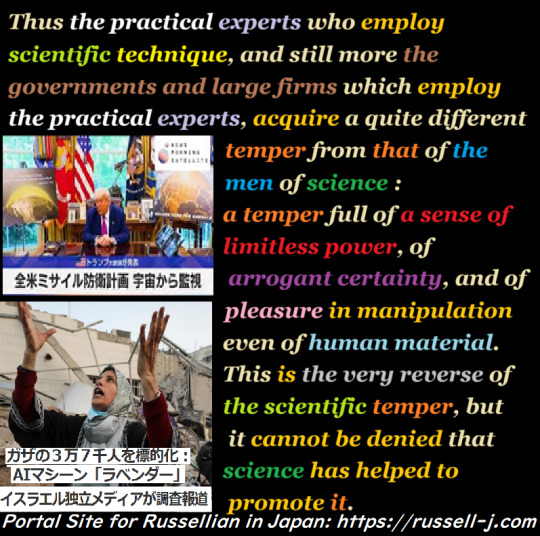
Bertrand Russell Quotes 366 with images, n3161 (June 27, 2025)
Thus the practical experts who employ scientific technique, and still more the governments and large firms which employ the practical experts, acquire a quite different temper from that of the men of science : a temper full of a sense of limitless power, of arrogant certainty, and of pleasure in manipulation even of human material. This is the very reverse of the scientific temper, but it cannot be denied that science has helped to promote it. https://russell-j.com/beginner/RS1935_10-010.HTM
a brief comment: Power is indispensable for maintaining social order and driving progress, yet once its checks loosen, it can run wild in an instant. Big data and AI share the same dual nature: while they make our lives more convenient, they also conceal processes we are apt to overlook. Take surveillance satellites and facial-recognition systems. With them, virtually anyone on Earth can be tracked in real time. In fact, both the United States and China have reportedly treated undocumented people and certain minorities as populations to be "managed," leading in some cases to detention and even killings. This is not just a distant problem. Closer to home, the Facebook-Cambridge Analytica scandal showed how tens of millions of psychological profiles could be fed into targeted political advertising, nudging public opinion below the waterline of awareness. The more dazzled we are by convenience, the more quietly these excesses advance. That is why we must keep asking ourselves where benefit ends and danger begins, and never relax our vigilance over power and technology, otherwise, our freedoms may be eroded before we realize it.
0 notes